BMP4002 Individual Written Report for Business Law
VerifiedAdded on 2023/06/17
|8
|2675
|176
AI Summary
This report covers the classifications of law in the English Legal system, the source of law, and the UK law making process for employment law. It also discusses the statutory duties of employers to their employees and wrongful and unfair dismissal actions. The subject is BMP4002 Business Law for BSc (Hons) Business Management.
Contribute Materials
Your contribution can guide someone’s learning journey. Share your
documents today.
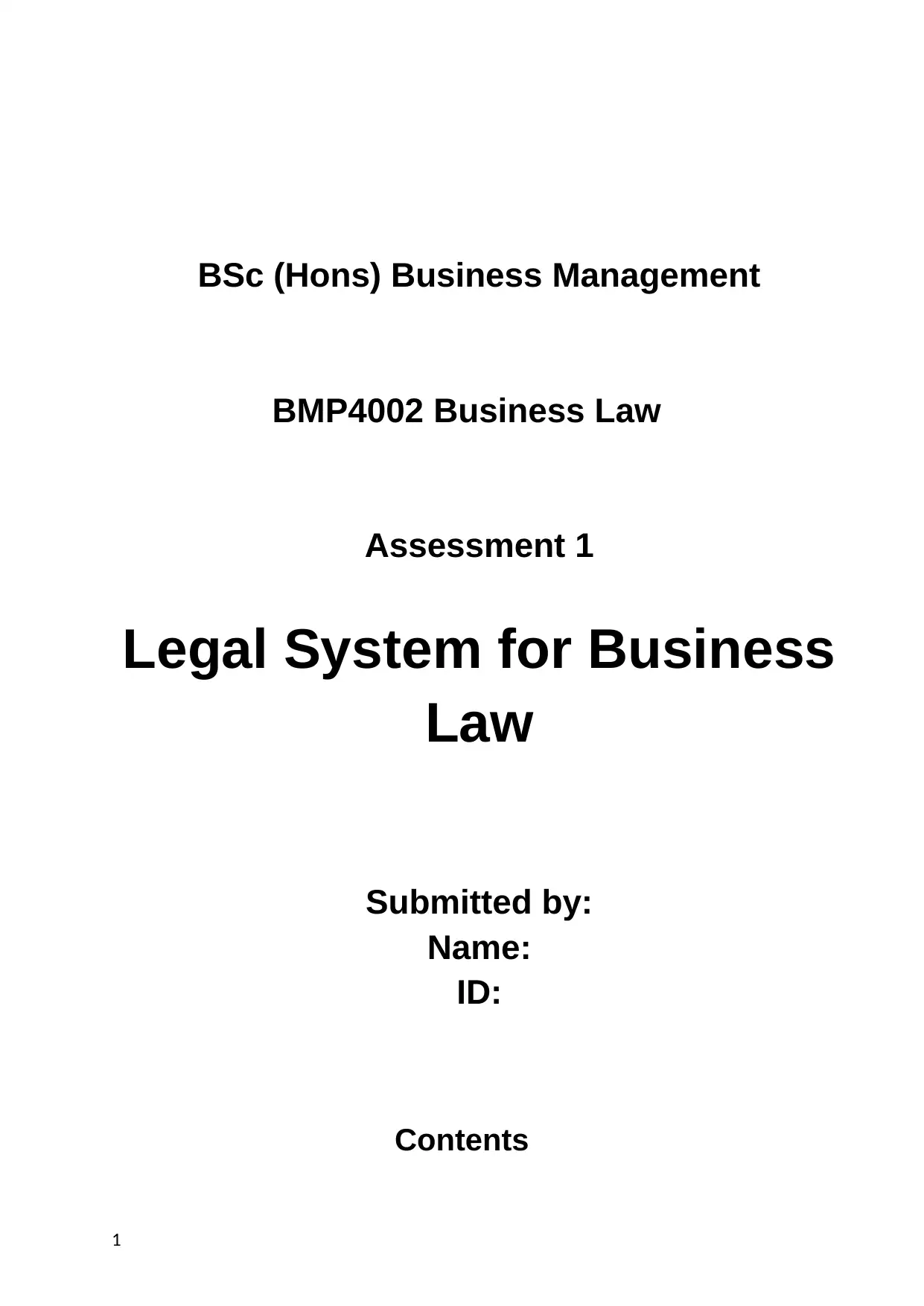
BSc (Hons) Business Management
BMP4002 Business Law
Assessment 1
Legal System for Business
Law
Submitted by:
Name:
ID:
Contents
1
BMP4002 Business Law
Assessment 1
Legal System for Business
Law
Submitted by:
Name:
ID:
Contents
1
Secure Best Marks with AI Grader
Need help grading? Try our AI Grader for instant feedback on your assignments.
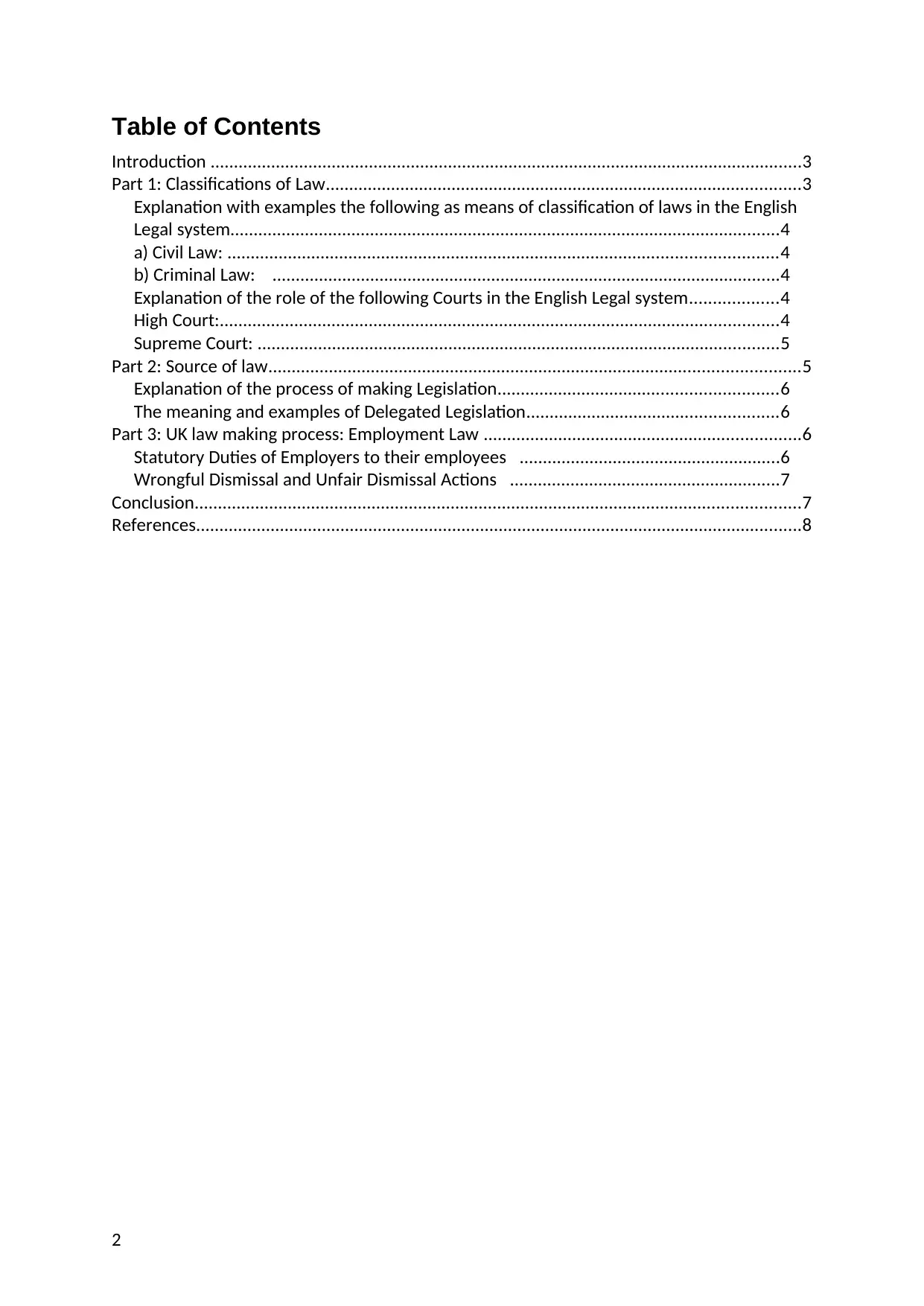
Table of Contents
Introduction ...............................................................................................................................3
Part 1: Classifications of Law......................................................................................................3
Explanation with examples the following as means of classification of laws in the English
Legal system......................................................................................................................4
a) Civil Law: ......................................................................................................................4
b) Criminal Law: .............................................................................................................4
Explanation of the role of the following Courts in the English Legal system...................4
High Court:........................................................................................................................4
Supreme Court: ................................................................................................................5
Part 2: Source of law..................................................................................................................5
Explanation of the process of making Legislation............................................................6
The meaning and examples of Delegated Legislation......................................................6
Part 3: UK law making process: Employment Law ....................................................................6
Statutory Duties of Employers to their employees ........................................................6
Wrongful Dismissal and Unfair Dismissal Actions ..........................................................7
Conclusion..................................................................................................................................7
References..................................................................................................................................8
2
Introduction ...............................................................................................................................3
Part 1: Classifications of Law......................................................................................................3
Explanation with examples the following as means of classification of laws in the English
Legal system......................................................................................................................4
a) Civil Law: ......................................................................................................................4
b) Criminal Law: .............................................................................................................4
Explanation of the role of the following Courts in the English Legal system...................4
High Court:........................................................................................................................4
Supreme Court: ................................................................................................................5
Part 2: Source of law..................................................................................................................5
Explanation of the process of making Legislation............................................................6
The meaning and examples of Delegated Legislation......................................................6
Part 3: UK law making process: Employment Law ....................................................................6
Statutory Duties of Employers to their employees ........................................................6
Wrongful Dismissal and Unfair Dismissal Actions ..........................................................7
Conclusion..................................................................................................................................7
References..................................................................................................................................8
2
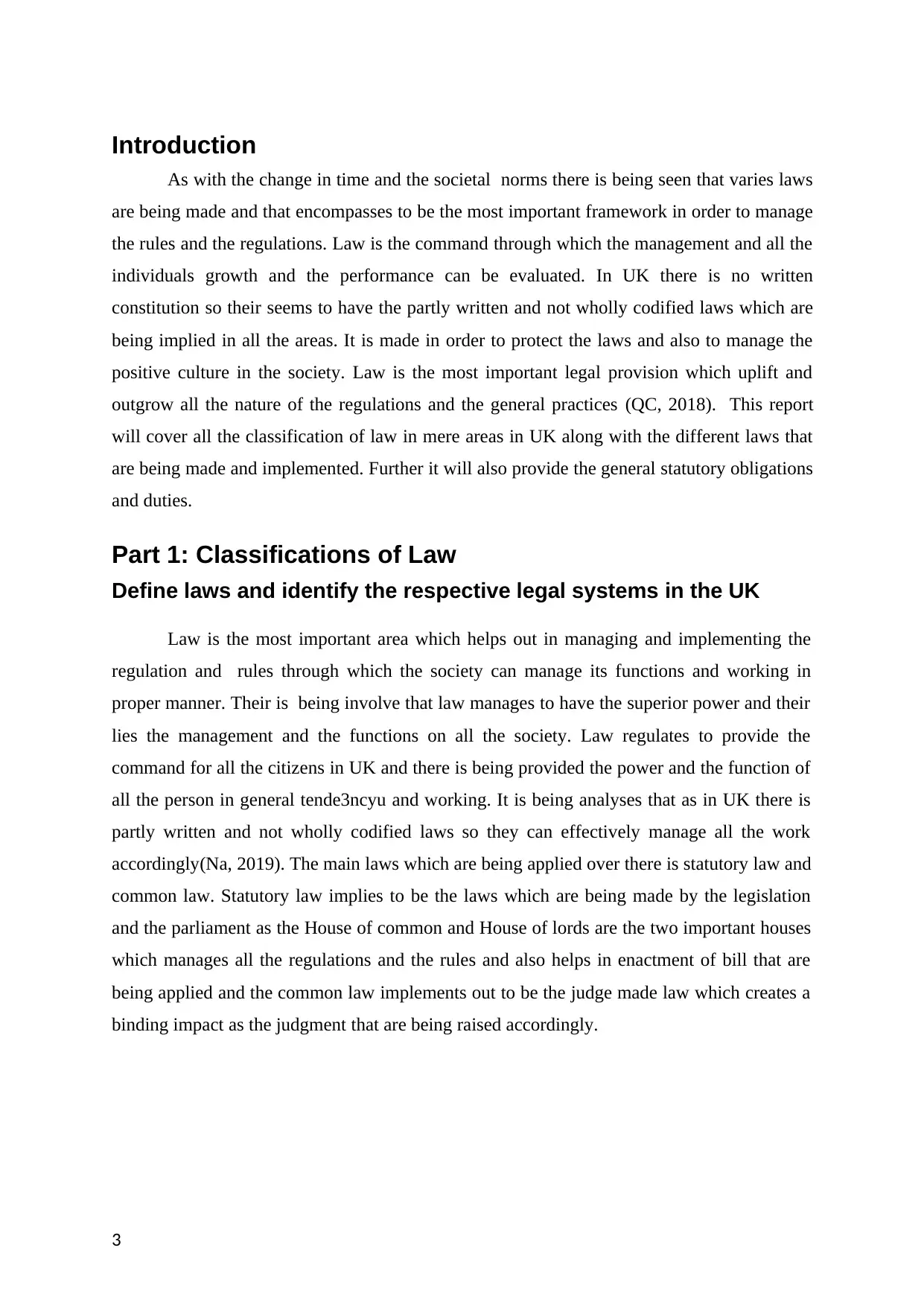
Introduction
As with the change in time and the societal norms there is being seen that varies laws
are being made and that encompasses to be the most important framework in order to manage
the rules and the regulations. Law is the command through which the management and all the
individuals growth and the performance can be evaluated. In UK there is no written
constitution so their seems to have the partly written and not wholly codified laws which are
being implied in all the areas. It is made in order to protect the laws and also to manage the
positive culture in the society. Law is the most important legal provision which uplift and
outgrow all the nature of the regulations and the general practices (QC, 2018). This report
will cover all the classification of law in mere areas in UK along with the different laws that
are being made and implemented. Further it will also provide the general statutory obligations
and duties.
Part 1: Classifications of Law
Define laws and identify the respective legal systems in the UK
Law is the most important area which helps out in managing and implementing the
regulation and rules through which the society can manage its functions and working in
proper manner. Their is being involve that law manages to have the superior power and their
lies the management and the functions on all the society. Law regulates to provide the
command for all the citizens in UK and there is being provided the power and the function of
all the person in general tende3ncyu and working. It is being analyses that as in UK there is
partly written and not wholly codified laws so they can effectively manage all the work
accordingly(Na, 2019). The main laws which are being applied over there is statutory law and
common law. Statutory law implies to be the laws which are being made by the legislation
and the parliament as the House of common and House of lords are the two important houses
which manages all the regulations and the rules and also helps in enactment of bill that are
being applied and the common law implements out to be the judge made law which creates a
binding impact as the judgment that are being raised accordingly.
3
As with the change in time and the societal norms there is being seen that varies laws
are being made and that encompasses to be the most important framework in order to manage
the rules and the regulations. Law is the command through which the management and all the
individuals growth and the performance can be evaluated. In UK there is no written
constitution so their seems to have the partly written and not wholly codified laws which are
being implied in all the areas. It is made in order to protect the laws and also to manage the
positive culture in the society. Law is the most important legal provision which uplift and
outgrow all the nature of the regulations and the general practices (QC, 2018). This report
will cover all the classification of law in mere areas in UK along with the different laws that
are being made and implemented. Further it will also provide the general statutory obligations
and duties.
Part 1: Classifications of Law
Define laws and identify the respective legal systems in the UK
Law is the most important area which helps out in managing and implementing the
regulation and rules through which the society can manage its functions and working in
proper manner. Their is being involve that law manages to have the superior power and their
lies the management and the functions on all the society. Law regulates to provide the
command for all the citizens in UK and there is being provided the power and the function of
all the person in general tende3ncyu and working. It is being analyses that as in UK there is
partly written and not wholly codified laws so they can effectively manage all the work
accordingly(Na, 2019). The main laws which are being applied over there is statutory law and
common law. Statutory law implies to be the laws which are being made by the legislation
and the parliament as the House of common and House of lords are the two important houses
which manages all the regulations and the rules and also helps in enactment of bill that are
being applied and the common law implements out to be the judge made law which creates a
binding impact as the judgment that are being raised accordingly.
3
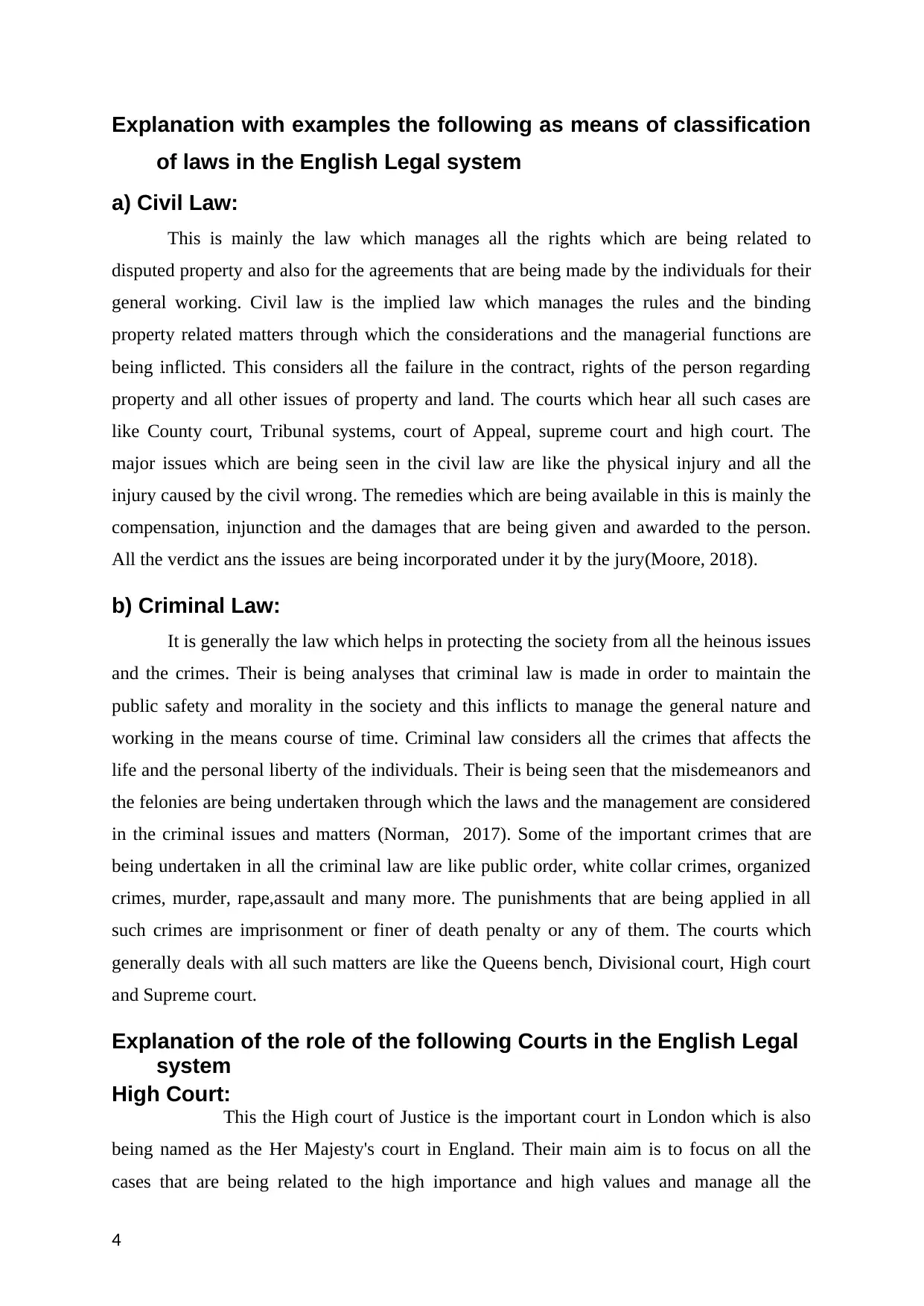
Explanation with examples the following as means of classification
of laws in the English Legal system
a) Civil Law:
This is mainly the law which manages all the rights which are being related to
disputed property and also for the agreements that are being made by the individuals for their
general working. Civil law is the implied law which manages the rules and the binding
property related matters through which the considerations and the managerial functions are
being inflicted. This considers all the failure in the contract, rights of the person regarding
property and all other issues of property and land. The courts which hear all such cases are
like County court, Tribunal systems, court of Appeal, supreme court and high court. The
major issues which are being seen in the civil law are like the physical injury and all the
injury caused by the civil wrong. The remedies which are being available in this is mainly the
compensation, injunction and the damages that are being given and awarded to the person.
All the verdict ans the issues are being incorporated under it by the jury(Moore, 2018).
b) Criminal Law:
It is generally the law which helps in protecting the society from all the heinous issues
and the crimes. Their is being analyses that criminal law is made in order to maintain the
public safety and morality in the society and this inflicts to manage the general nature and
working in the means course of time. Criminal law considers all the crimes that affects the
life and the personal liberty of the individuals. Their is being seen that the misdemeanors and
the felonies are being undertaken through which the laws and the management are considered
in the criminal issues and matters (Norman, 2017). Some of the important crimes that are
being undertaken in all the criminal law are like public order, white collar crimes, organized
crimes, murder, rape,assault and many more. The punishments that are being applied in all
such crimes are imprisonment or finer of death penalty or any of them. The courts which
generally deals with all such matters are like the Queens bench, Divisional court, High court
and Supreme court.
Explanation of the role of the following Courts in the English Legal
system
High Court:
This the High court of Justice is the important court in London which is also
being named as the Her Majesty's court in England. Their main aim is to focus on all the
cases that are being related to the high importance and high values and manage all the
4
of laws in the English Legal system
a) Civil Law:
This is mainly the law which manages all the rights which are being related to
disputed property and also for the agreements that are being made by the individuals for their
general working. Civil law is the implied law which manages the rules and the binding
property related matters through which the considerations and the managerial functions are
being inflicted. This considers all the failure in the contract, rights of the person regarding
property and all other issues of property and land. The courts which hear all such cases are
like County court, Tribunal systems, court of Appeal, supreme court and high court. The
major issues which are being seen in the civil law are like the physical injury and all the
injury caused by the civil wrong. The remedies which are being available in this is mainly the
compensation, injunction and the damages that are being given and awarded to the person.
All the verdict ans the issues are being incorporated under it by the jury(Moore, 2018).
b) Criminal Law:
It is generally the law which helps in protecting the society from all the heinous issues
and the crimes. Their is being analyses that criminal law is made in order to maintain the
public safety and morality in the society and this inflicts to manage the general nature and
working in the means course of time. Criminal law considers all the crimes that affects the
life and the personal liberty of the individuals. Their is being seen that the misdemeanors and
the felonies are being undertaken through which the laws and the management are considered
in the criminal issues and matters (Norman, 2017). Some of the important crimes that are
being undertaken in all the criminal law are like public order, white collar crimes, organized
crimes, murder, rape,assault and many more. The punishments that are being applied in all
such crimes are imprisonment or finer of death penalty or any of them. The courts which
generally deals with all such matters are like the Queens bench, Divisional court, High court
and Supreme court.
Explanation of the role of the following Courts in the English Legal
system
High Court:
This the High court of Justice is the important court in London which is also
being named as the Her Majesty's court in England. Their main aim is to focus on all the
cases that are being related to the high importance and high values and manage all the
4
Secure Best Marks with AI Grader
Need help grading? Try our AI Grader for instant feedback on your assignments.
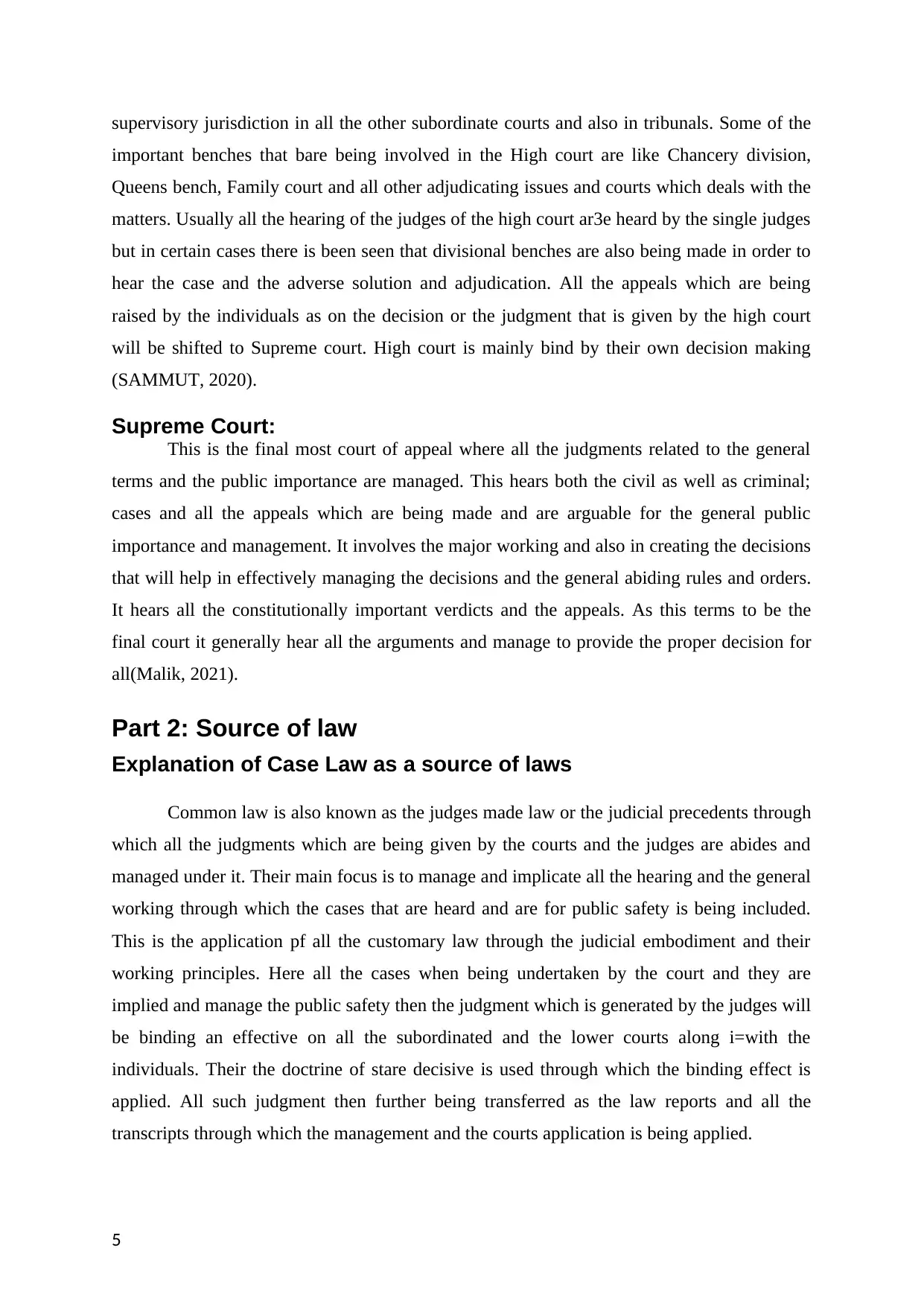
supervisory jurisdiction in all the other subordinate courts and also in tribunals. Some of the
important benches that bare being involved in the High court are like Chancery division,
Queens bench, Family court and all other adjudicating issues and courts which deals with the
matters. Usually all the hearing of the judges of the high court ar3e heard by the single judges
but in certain cases there is been seen that divisional benches are also being made in order to
hear the case and the adverse solution and adjudication. All the appeals which are being
raised by the individuals as on the decision or the judgment that is given by the high court
will be shifted to Supreme court. High court is mainly bind by their own decision making
(SAMMUT, 2020).
Supreme Court:
This is the final most court of appeal where all the judgments related to the general
terms and the public importance are managed. This hears both the civil as well as criminal;
cases and all the appeals which are being made and are arguable for the general public
importance and management. It involves the major working and also in creating the decisions
that will help in effectively managing the decisions and the general abiding rules and orders.
It hears all the constitutionally important verdicts and the appeals. As this terms to be the
final court it generally hear all the arguments and manage to provide the proper decision for
all(Malik, 2021).
Part 2: Source of law
Explanation of Case Law as a source of laws
Common law is also known as the judges made law or the judicial precedents through
which all the judgments which are being given by the courts and the judges are abides and
managed under it. Their main focus is to manage and implicate all the hearing and the general
working through which the cases that are heard and are for public safety is being included.
This is the application pf all the customary law through the judicial embodiment and their
working principles. Here all the cases when being undertaken by the court and they are
implied and manage the public safety then the judgment which is generated by the judges will
be binding an effective on all the subordinated and the lower courts along i=with the
individuals. Their the doctrine of stare decisive is used through which the binding effect is
applied. All such judgment then further being transferred as the law reports and all the
transcripts through which the management and the courts application is being applied.
5
important benches that bare being involved in the High court are like Chancery division,
Queens bench, Family court and all other adjudicating issues and courts which deals with the
matters. Usually all the hearing of the judges of the high court ar3e heard by the single judges
but in certain cases there is been seen that divisional benches are also being made in order to
hear the case and the adverse solution and adjudication. All the appeals which are being
raised by the individuals as on the decision or the judgment that is given by the high court
will be shifted to Supreme court. High court is mainly bind by their own decision making
(SAMMUT, 2020).
Supreme Court:
This is the final most court of appeal where all the judgments related to the general
terms and the public importance are managed. This hears both the civil as well as criminal;
cases and all the appeals which are being made and are arguable for the general public
importance and management. It involves the major working and also in creating the decisions
that will help in effectively managing the decisions and the general abiding rules and orders.
It hears all the constitutionally important verdicts and the appeals. As this terms to be the
final court it generally hear all the arguments and manage to provide the proper decision for
all(Malik, 2021).
Part 2: Source of law
Explanation of Case Law as a source of laws
Common law is also known as the judges made law or the judicial precedents through
which all the judgments which are being given by the courts and the judges are abides and
managed under it. Their main focus is to manage and implicate all the hearing and the general
working through which the cases that are heard and are for public safety is being included.
This is the application pf all the customary law through the judicial embodiment and their
working principles. Here all the cases when being undertaken by the court and they are
implied and manage the public safety then the judgment which is generated by the judges will
be binding an effective on all the subordinated and the lower courts along i=with the
individuals. Their the doctrine of stare decisive is used through which the binding effect is
applied. All such judgment then further being transferred as the law reports and all the
transcripts through which the management and the courts application is being applied.
5
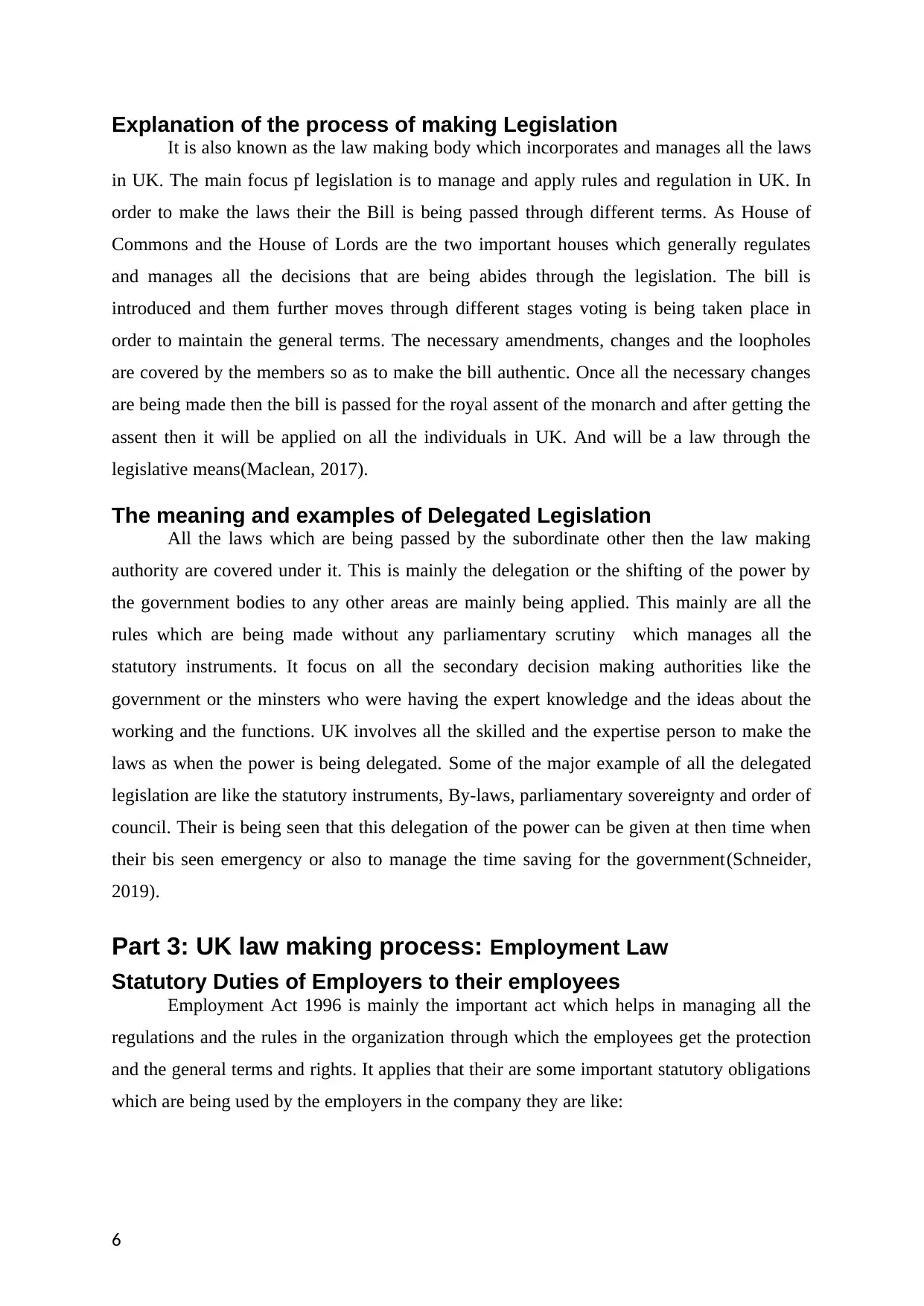
Explanation of the process of making Legislation
It is also known as the law making body which incorporates and manages all the laws
in UK. The main focus pf legislation is to manage and apply rules and regulation in UK. In
order to make the laws their the Bill is being passed through different terms. As House of
Commons and the House of Lords are the two important houses which generally regulates
and manages all the decisions that are being abides through the legislation. The bill is
introduced and them further moves through different stages voting is being taken place in
order to maintain the general terms. The necessary amendments, changes and the loopholes
are covered by the members so as to make the bill authentic. Once all the necessary changes
are being made then the bill is passed for the royal assent of the monarch and after getting the
assent then it will be applied on all the individuals in UK. And will be a law through the
legislative means(Maclean, 2017).
The meaning and examples of Delegated Legislation
All the laws which are being passed by the subordinate other then the law making
authority are covered under it. This is mainly the delegation or the shifting of the power by
the government bodies to any other areas are mainly being applied. This mainly are all the
rules which are being made without any parliamentary scrutiny which manages all the
statutory instruments. It focus on all the secondary decision making authorities like the
government or the minsters who were having the expert knowledge and the ideas about the
working and the functions. UK involves all the skilled and the expertise person to make the
laws as when the power is being delegated. Some of the major example of all the delegated
legislation are like the statutory instruments, By-laws, parliamentary sovereignty and order of
council. Their is being seen that this delegation of the power can be given at then time when
their bis seen emergency or also to manage the time saving for the government(Schneider,
2019).
Part 3: UK law making process: Employment Law
Statutory Duties of Employers to their employees
Employment Act 1996 is mainly the important act which helps in managing all the
regulations and the rules in the organization through which the employees get the protection
and the general terms and rights. It applies that their are some important statutory obligations
which are being used by the employers in the company they are like:
6
It is also known as the law making body which incorporates and manages all the laws
in UK. The main focus pf legislation is to manage and apply rules and regulation in UK. In
order to make the laws their the Bill is being passed through different terms. As House of
Commons and the House of Lords are the two important houses which generally regulates
and manages all the decisions that are being abides through the legislation. The bill is
introduced and them further moves through different stages voting is being taken place in
order to maintain the general terms. The necessary amendments, changes and the loopholes
are covered by the members so as to make the bill authentic. Once all the necessary changes
are being made then the bill is passed for the royal assent of the monarch and after getting the
assent then it will be applied on all the individuals in UK. And will be a law through the
legislative means(Maclean, 2017).
The meaning and examples of Delegated Legislation
All the laws which are being passed by the subordinate other then the law making
authority are covered under it. This is mainly the delegation or the shifting of the power by
the government bodies to any other areas are mainly being applied. This mainly are all the
rules which are being made without any parliamentary scrutiny which manages all the
statutory instruments. It focus on all the secondary decision making authorities like the
government or the minsters who were having the expert knowledge and the ideas about the
working and the functions. UK involves all the skilled and the expertise person to make the
laws as when the power is being delegated. Some of the major example of all the delegated
legislation are like the statutory instruments, By-laws, parliamentary sovereignty and order of
council. Their is being seen that this delegation of the power can be given at then time when
their bis seen emergency or also to manage the time saving for the government(Schneider,
2019).
Part 3: UK law making process: Employment Law
Statutory Duties of Employers to their employees
Employment Act 1996 is mainly the important act which helps in managing all the
regulations and the rules in the organization through which the employees get the protection
and the general terms and rights. It applies that their are some important statutory obligations
which are being used by the employers in the company they are like:
6
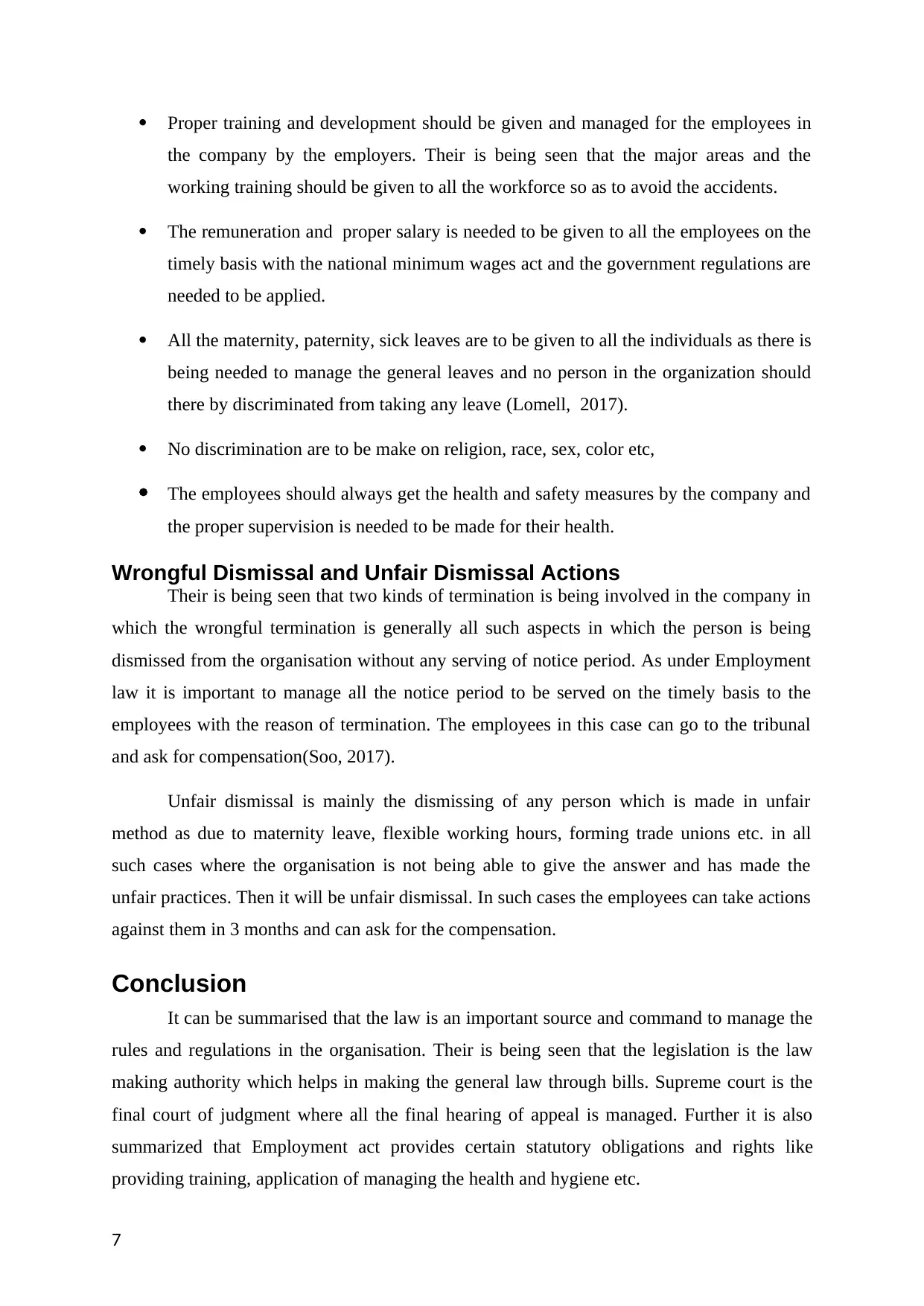
Proper training and development should be given and managed for the employees in
the company by the employers. Their is being seen that the major areas and the
working training should be given to all the workforce so as to avoid the accidents.
The remuneration and proper salary is needed to be given to all the employees on the
timely basis with the national minimum wages act and the government regulations are
needed to be applied.
All the maternity, paternity, sick leaves are to be given to all the individuals as there is
being needed to manage the general leaves and no person in the organization should
there by discriminated from taking any leave (Lomell, 2017).
No discrimination are to be make on religion, race, sex, color etc,
The employees should always get the health and safety measures by the company and
the proper supervision is needed to be made for their health.
Wrongful Dismissal and Unfair Dismissal Actions
Their is being seen that two kinds of termination is being involved in the company in
which the wrongful termination is generally all such aspects in which the person is being
dismissed from the organisation without any serving of notice period. As under Employment
law it is important to manage all the notice period to be served on the timely basis to the
employees with the reason of termination. The employees in this case can go to the tribunal
and ask for compensation(Soo, 2017).
Unfair dismissal is mainly the dismissing of any person which is made in unfair
method as due to maternity leave, flexible working hours, forming trade unions etc. in all
such cases where the organisation is not being able to give the answer and has made the
unfair practices. Then it will be unfair dismissal. In such cases the employees can take actions
against them in 3 months and can ask for the compensation.
Conclusion
It can be summarised that the law is an important source and command to manage the
rules and regulations in the organisation. Their is being seen that the legislation is the law
making authority which helps in making the general law through bills. Supreme court is the
final court of judgment where all the final hearing of appeal is managed. Further it is also
summarized that Employment act provides certain statutory obligations and rights like
providing training, application of managing the health and hygiene etc.
7
the company by the employers. Their is being seen that the major areas and the
working training should be given to all the workforce so as to avoid the accidents.
The remuneration and proper salary is needed to be given to all the employees on the
timely basis with the national minimum wages act and the government regulations are
needed to be applied.
All the maternity, paternity, sick leaves are to be given to all the individuals as there is
being needed to manage the general leaves and no person in the organization should
there by discriminated from taking any leave (Lomell, 2017).
No discrimination are to be make on religion, race, sex, color etc,
The employees should always get the health and safety measures by the company and
the proper supervision is needed to be made for their health.
Wrongful Dismissal and Unfair Dismissal Actions
Their is being seen that two kinds of termination is being involved in the company in
which the wrongful termination is generally all such aspects in which the person is being
dismissed from the organisation without any serving of notice period. As under Employment
law it is important to manage all the notice period to be served on the timely basis to the
employees with the reason of termination. The employees in this case can go to the tribunal
and ask for compensation(Soo, 2017).
Unfair dismissal is mainly the dismissing of any person which is made in unfair
method as due to maternity leave, flexible working hours, forming trade unions etc. in all
such cases where the organisation is not being able to give the answer and has made the
unfair practices. Then it will be unfair dismissal. In such cases the employees can take actions
against them in 3 months and can ask for the compensation.
Conclusion
It can be summarised that the law is an important source and command to manage the
rules and regulations in the organisation. Their is being seen that the legislation is the law
making authority which helps in making the general law through bills. Supreme court is the
final court of judgment where all the final hearing of appeal is managed. Further it is also
summarized that Employment act provides certain statutory obligations and rights like
providing training, application of managing the health and hygiene etc.
7
Paraphrase This Document
Need a fresh take? Get an instant paraphrase of this document with our AI Paraphraser
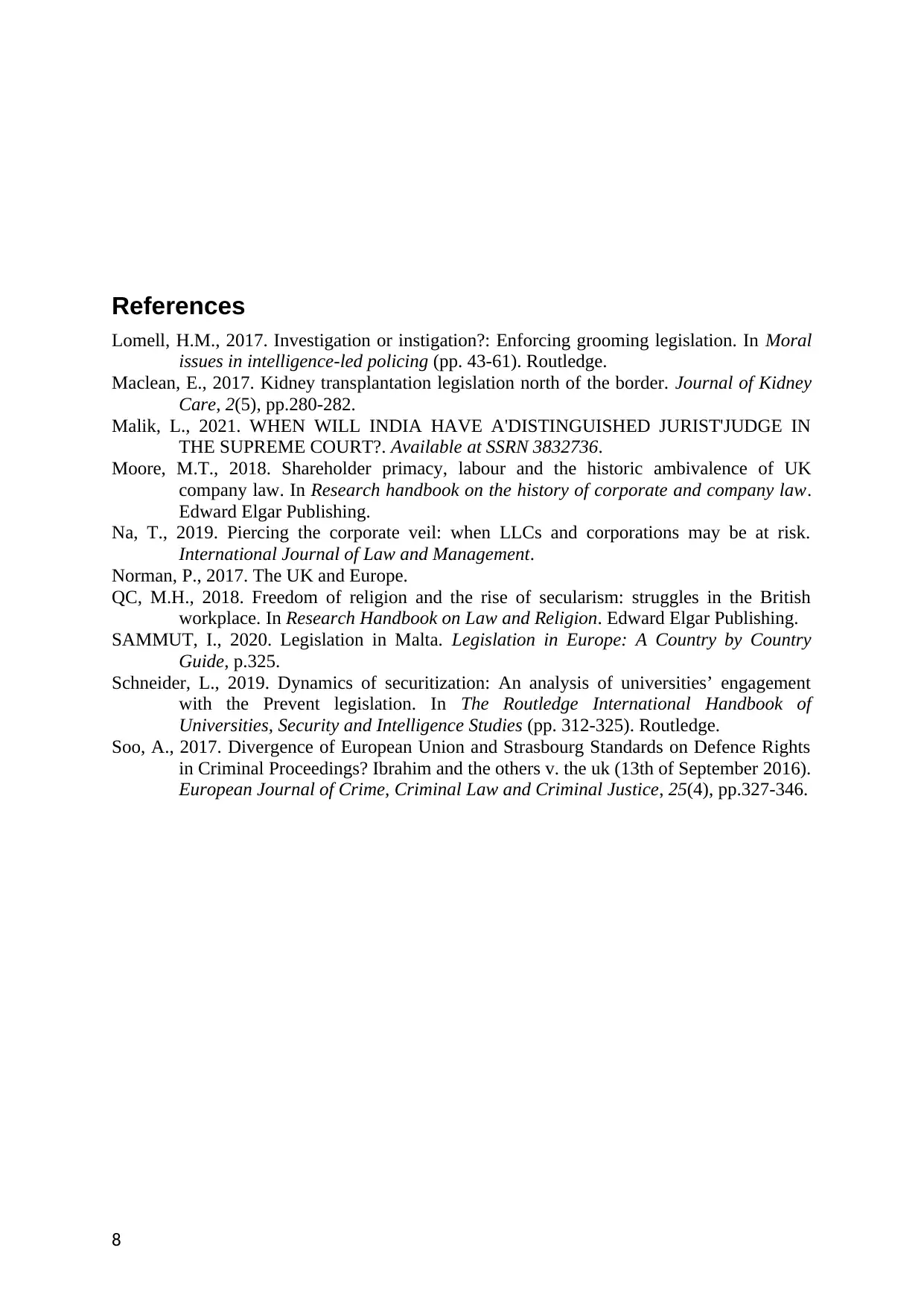
References
Lomell, H.M., 2017. Investigation or instigation?: Enforcing grooming legislation. In Moral
issues in intelligence-led policing (pp. 43-61). Routledge.
Maclean, E., 2017. Kidney transplantation legislation north of the border. Journal of Kidney
Care, 2(5), pp.280-282.
Malik, L., 2021. WHEN WILL INDIA HAVE A'DISTINGUISHED JURIST'JUDGE IN
THE SUPREME COURT?. Available at SSRN 3832736.
Moore, M.T., 2018. Shareholder primacy, labour and the historic ambivalence of UK
company law. In Research handbook on the history of corporate and company law.
Edward Elgar Publishing.
Na, T., 2019. Piercing the corporate veil: when LLCs and corporations may be at risk.
International Journal of Law and Management.
Norman, P., 2017. The UK and Europe.
QC, M.H., 2018. Freedom of religion and the rise of secularism: struggles in the British
workplace. In Research Handbook on Law and Religion. Edward Elgar Publishing.
SAMMUT, I., 2020. Legislation in Malta. Legislation in Europe: A Country by Country
Guide, p.325.
Schneider, L., 2019. Dynamics of securitization: An analysis of universities’ engagement
with the Prevent legislation. In The Routledge International Handbook of
Universities, Security and Intelligence Studies (pp. 312-325). Routledge.
Soo, A., 2017. Divergence of European Union and Strasbourg Standards on Defence Rights
in Criminal Proceedings? Ibrahim and the others v. the uk (13th of September 2016).
European Journal of Crime, Criminal Law and Criminal Justice, 25(4), pp.327-346.
8
Lomell, H.M., 2017. Investigation or instigation?: Enforcing grooming legislation. In Moral
issues in intelligence-led policing (pp. 43-61). Routledge.
Maclean, E., 2017. Kidney transplantation legislation north of the border. Journal of Kidney
Care, 2(5), pp.280-282.
Malik, L., 2021. WHEN WILL INDIA HAVE A'DISTINGUISHED JURIST'JUDGE IN
THE SUPREME COURT?. Available at SSRN 3832736.
Moore, M.T., 2018. Shareholder primacy, labour and the historic ambivalence of UK
company law. In Research handbook on the history of corporate and company law.
Edward Elgar Publishing.
Na, T., 2019. Piercing the corporate veil: when LLCs and corporations may be at risk.
International Journal of Law and Management.
Norman, P., 2017. The UK and Europe.
QC, M.H., 2018. Freedom of religion and the rise of secularism: struggles in the British
workplace. In Research Handbook on Law and Religion. Edward Elgar Publishing.
SAMMUT, I., 2020. Legislation in Malta. Legislation in Europe: A Country by Country
Guide, p.325.
Schneider, L., 2019. Dynamics of securitization: An analysis of universities’ engagement
with the Prevent legislation. In The Routledge International Handbook of
Universities, Security and Intelligence Studies (pp. 312-325). Routledge.
Soo, A., 2017. Divergence of European Union and Strasbourg Standards on Defence Rights
in Criminal Proceedings? Ibrahim and the others v. the uk (13th of September 2016).
European Journal of Crime, Criminal Law and Criminal Justice, 25(4), pp.327-346.
8
1 out of 8
Related Documents
Your All-in-One AI-Powered Toolkit for Academic Success.
+13062052269
info@desklib.com
Available 24*7 on WhatsApp / Email
![[object Object]](/_next/static/media/star-bottom.7253800d.svg)
Unlock your academic potential
© 2024 | Zucol Services PVT LTD | All rights reserved.